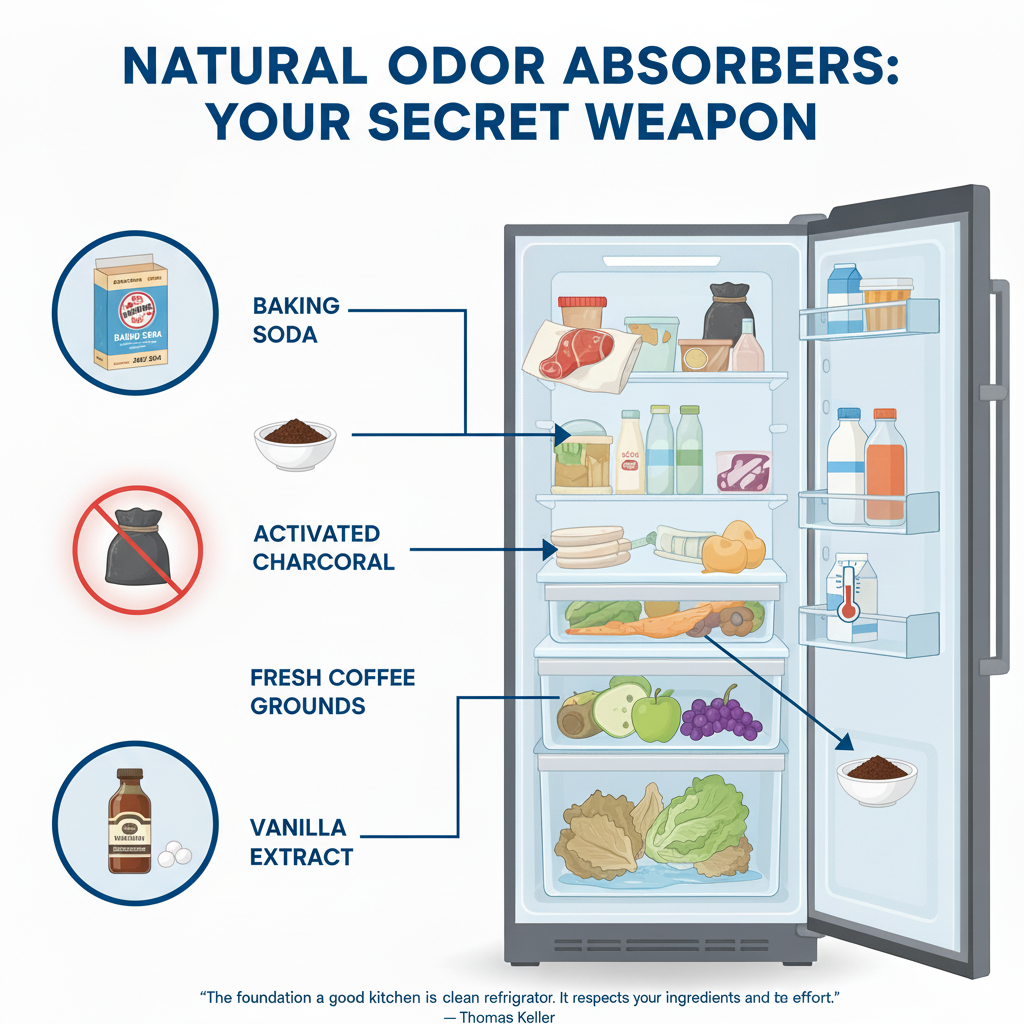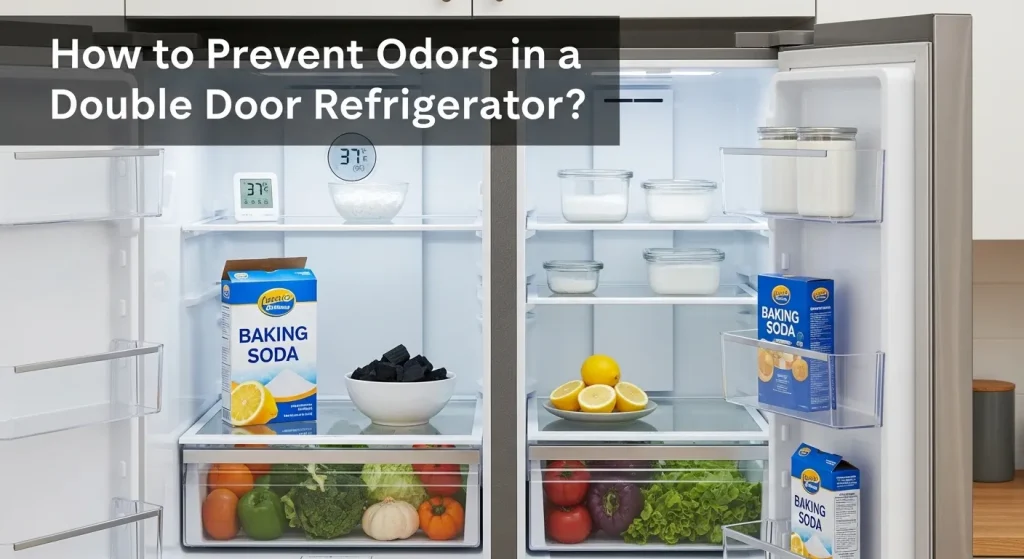Keeping your double door refrigerator smelling fresh starts with consistent cleaning and proper food storage. It’s about building smart habits to stop odors before they have a chance to start.
My Guide to a Fresh-Smelling Double Door Refrigerator
There’s nothing quite like the feeling of opening my refrigerator to a clean, fresh smell. It makes me feel good about the food I’m feeding my family. But I’ve also experienced the opposite—that moment you open the door and get hit with a mysterious, funky smell. It’s unpleasant, and it makes you wonder if something’s gone bad or if your appliance needs help.
Over the years, I’ve learned that preventing odors in a double door fridge isn’t about one magic trick. It’s a combination of good practices, from how you store your groceries to how you clean the interior. I want to share everything I’ve learned so you can enjoy a consistently fresh appliance.
Why Do Odors Happen in the First Place?

To solve a problem, you first need to know what causes it. In a refrigerator, odors are almost always caused by bacteria growth on food spills and spoiled items. Your fridge is a cool, enclosed space, so any smell from one item can quickly spread to others. The air circulation inside moves those odor particles around, meaning a forgotten piece of cheese in the dairy compartment can eventually make your fresh fruits in the crisper drawer taste funny.
Different areas are common culprits. The vegetable crisper can trap moisture and cause produce to rot. The glass shelves might have hidden spills from a leaking package. The door bins, which experience slight temperature fluctuations from opening and closing, can sometimes be a problem spot for items like milk or juice.
Your First Line of Defense: Smart Food Storage

This is the single most effective step you can take. How you put your groceries away makes a huge difference.
- Seal Everything: I always transfer leftovers into airtight containers. Glass containers are my favorite because they don’t absorb stains or smells like plastic sometimes can. Never just put a plate of food directly on the shelf; cover it tightly with cling film or, better yet, put it in a container.
- Check Packaging: Store-bought items don’t always come in secure packaging. If you buy meat from the butcher, ask for it to be wrapped well. I often double-wrap strong-smelling foods like fish or certain cheeses in foil or plastic wrap before placing them in the fridge.
- Use the Crisper Drawers Correctly: These drawers are more than just bins; they control humidity. I use the high-humidity setting for things that wilt, like leafy greens and herbs. I use the low-humidity setting for fruits that produce ethylene gas, like apples and pears, to keep them from speeding up the ripening (and rotting) of other produce nearby.
- Keep an Eye on Fruits and Vegetables: I make it a habit to check my produce every few days. One rotten berry can spoil the whole pint. Remove any spoiled pieces immediately to prevent the mold from spreading.
The Cleaning Routine: Non-Negotiable for Freshness
Even with careful storage, spills happen. A regular cleaning schedule is essential for odor prevention.
- The Quick Wipe: I keep a spray bottle with a mix of equal parts white vinegar and water and a clean cloth under my sink. Whenever I see a small spill—maybe some milk dripped or a bit of sauce splattered—I wipe it up right away. This takes ten seconds and prevents a sticky, smelly mess later.
- The Deep Clean: Every two to three months, or whenever I notice a lingering smell, I do a full clean-out. Here’s my process:
- Unplug the Fridge: Safety first! I always unplug my refrigerator to save energy and stay safe while I clean.
- Remove All Food: I take everything out and place it in a cooler with ice packs to keep it cold and safe.
- Take Out Shelves and Drawers: All removable parts—glass shelves, crisper drawers, door bins—come out. I wash them in warm, soapy water in my kitchen sink. For tough stains, I let them soak. I dry them completely with a clean towel before putting them back. This prevents water spots and helps the fridge maintain its temperature more efficiently.
- Clean the Interior: I use my vinegar and water solution to wipe down every single surface inside the fridge—the walls, the door seals, the light cover. Vinegar is a fantastic, natural deodorizer that neutralizes smells instead of just covering them up. For stubborn stains or sticky spots, a paste of baking soda and water works wonders. I just gently scrub it on and wipe it away.
- Don’t Forget the Gasket! The rubber seal around the door, called the gasket, is a common place for mold and mildew to grow because crumbs and moisture get trapped there. I carefully wipe it down with the vinegar solution and a toothbrush to get into the crevices. A clean gasket also ensures a tight seal, which is vital for energy efficiency.
- Dry Thoroughly: Before I plug the fridge back in and restock it, I make sure everything is 100% dry with a clean cloth.
Natural Odor Absorbers: Your Secret Weapon

Even with a clean fridge, sometimes you need a little extra help. I never use chemical air fresheners near my food. Instead, I rely on these natural odor absorbers:
- Baking Soda: This is the classic for a reason. I keep an open box of baking soda on a shelf in both the refrigerator and freezer compartments. It actively absorbs odors. I write the date on the box and replace it every three months for maximum effectiveness.
- Activated Charcoal: I’ve started using small bags of activated charcoal, which you can find online or in stores. They are extremely effective at trapping odor molecules and last longer than baking soda—usually about a year.
- Fresh Coffee Grounds: A small bowl of used, dry coffee grounds can absorb strong smells for a week or two.
- Vanilla Extract: For a quick freshen-up after cleaning, I put a few drops of vanilla extract on a cotton ball and place it on a shelf for a few hours. It leaves a lovely, subtle scent.
“The foundation of a good kitchen is a clean refrigerator. It respects your ingredients and your effort.”
— Thomas Keller
Troubleshooting Persistent Odors
What if you’ve cleaned everything and the smell just won’t go away? Here’s what I check:
- The Drip Pan: Many modern refrigerators have a drip pan (or condensate pan) located at the bottom, near the compressor. Over time, this can collect water and become a breeding ground for bacteria and mold, causing a musty smell that seems to come from everywhere. Consult your user manual for its location and cleaning instructions. You may need to pull the fridge out to access it.
- The Freezer Section: Don’t forget the freezer! Old frozen food can develop freezer burn and impart off-flavors. I do a freezer audit every six months, using up older items and discarding anything with severe freezer burn.
- Temperature Settings: Is your fridge cold enough? The ideal temperature for the fresh food compartment is at or below 40°F (4°C), and the freezer should be at 0°F (-18°C). If the temperature is too high, food will spoil much faster, creating odors.
Frequently Asked Questions for How to Prevent Odors in a Double Door Refrigerator?
Can I use scented soaps or cleaners to wash the inside of my fridge?
I don’t recommend it. Strong chemical scents can linger and get into your food, altering its taste. Stick to mild, food-safe cleaners like baking soda, vinegar, or a little dish soap with water.
How often should I replace my box of baking soda?
For the best odor control, mark your calendar and replace it every three months. It loses its effectiveness over time.
What’s the fastest way to get a bad smell out?
After a thorough cleaning, place a shallow bowl of fresh coffee grounds or a dish of activated charcoal inside, close the door, and leave it for 12-24 hours. This should absorb the lingering odor.
My fridge smells musty, like mildew. What does that mean?
A musty smell often points to excess moisture. Check that your drain hole (if your model has one) isn’t clogged. Also, ensure food is covered to prevent moisture from evaporating, and confirm the door seal is clean and tight.
“Cleanliness is not next to godliness. It isn’t even in the same neighborhood. No one has ever gotten a religious experience out of removing burned-on cheese from the grill of the toaster oven. But it is a good way to make your life a little better.”
— Neil Gaiman
A Final Thought
Maintaining a fresh-smelling double door refrigerator is a simple act of care. It’s about respecting your food, your appliance, and the people you cook for. It doesn’t require fancy products or a huge amount of time—just consistent, small habits.
By storing food properly, wiping up spills immediately, and doing a deep clean every few months, you’ll never have to dread opening your fridge door again. You’ll be greeted by a cool, clean, and fresh space that makes cooking and living a little more pleasant.
“The only real stumbling block is fear of failure. In cooking, you’ve got to have a what-the-hell attitude.”
— Julia Child
And that includes not being afraid to tackle that fridge clean-out! You’ve got this.







